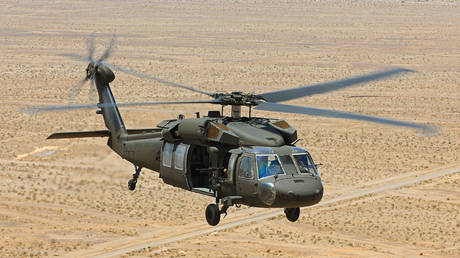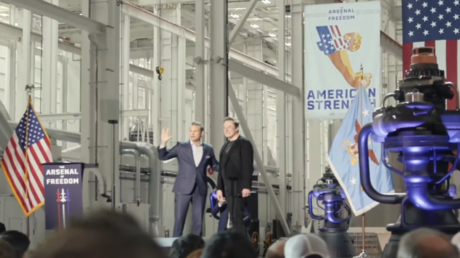
The first known unmanned flight of its kind was carried out by a US arms company for the Pentagon
A UH-60 Black Hawk helicopter equipped with autonomous flight software took off last week, performed a series of maneuvers, and safely landed again without a pilot, aviation firm Sikorsky has announced. The first-of-its-kind flight, undertaken as a US military research project, has been described as a “game changer” by AI developers.
Lockheed Martin-owned helicopter manufacturer Sikorsky and the Pentagon’s Defense Advanced Research Projects Agency (DARPA) have been developing their ALIAS autonomous flight program since 2015, but test flights to date have always kept a human pilot on board in case of failure.
The program’s first entirely unmanned flight took place on February 5. According to a press release from Sikorsky, the helicopter’s crew flipped a switch in the cockpit to enable full autonomy, then exited the aircraft as it carried out pre-flight checks on its own.
The helicopter then took off and navigated through a simulated cityscape, avoiding buildings and recalculating its route on the fly, the company said. Afterwards it made a series of turns and maneuvers before safely landing itself, at which point the crew reentered the craft and took control again.
According to Sikorsky, a switch inside the cockpit will let the flight crew flip between manual control and autonomy at any point on a helicopter equipped with the new technology.
These “advancements in flight automation and autonomy will be game-changers for Army aviators and ground commanders,” Sikorsky developer Jay Macklin claimed, while test pilot Benjamin Williamson predicted that the systems will save lives by detecting and preventing dangerous situations, particularly in conditions of low visibility or confined areas.
However, while ALIAS technology may be cutting-edge, the helicopter it’s being trialed on isn’t. The UH-60 Black Hawk has been in use as a medium transport helicopter since 1981, and the Pentagon is currently searching for a replacement. Two candidates have emerged: Sikorsky’s ‘Defiant X’ prototype and Textron’s Bell V-280 Valor, the latter of which is a tilt-rotor craft and not technically a helicopter.
Like the F-35 fighter developed by its parent company, the ‘Defiant X’ project has been plagued by delays. Sikorsky has a history of failed helicopter projects too, with the Pentagon canceling the Comanche helicopter program in 2004 after spending $7 billion and receiving only two aircraft in more than 20 years.




